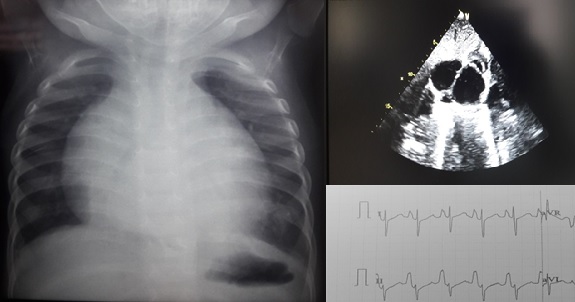Restrictive cardiomyopathy: a pediatric case report Case report
Main Article Content
Abstract
Introduction: Restrictive cardiomyopathy (RCM) is a rare condition with a poor prognosis in pediatric patients. It is the least common variant within cardiomyopathies and, in most cases, its etiology is unknown. It has a dire prognosis unless a heart transplant can be performed.
Case: Here, we report a 1-year-old boy with a history of respiratory infections and dyspnea when suckling his mother's breast. He was admitted with dyspnea, cyanosis, and edema. Physical examination describes the presence of a grade IV/VI systolic murmur at the left sternal border. The respiratory rate was 60 per minute with the presence of intercostal, subcostal, suprasternal retraction as well as hepatomegaly.
Evolution: Laboratory data showed the presence of leukocytosis and normochromic normocytic anemia. Chest radiography showed grade IV cardiomegaly. The echocardiogram showed atrial growth and the presence of patent foramen ovale. There was preserved systolic function with a restrictive relaxation pattern and pulmonary hypertension (47 mmHg). Magnetic resonance imaging of the heart revealed enlargement of the atrial chambers with normal myocardial thickness. The subject was managed as restrictive cardiomyopathy with furosemide, spironolactone, and antiplatelet agents. The patient was discharged with the same indications for outpatient consultation.
Conclusion: Radiography and electrocardiogram can provide important data for diagnosis. The echocardiogram remains the best study for this diagnosis. The use of functional measurements such as tissue Doppler can help to show early diastolic failure.
Downloads
Article Details

This work is licensed under a Creative Commons Attribution-NonCommercial 4.0 International License.

